Editor's Corner Guest Essay: Herbivores or Omnivores?
By Will Tuttle
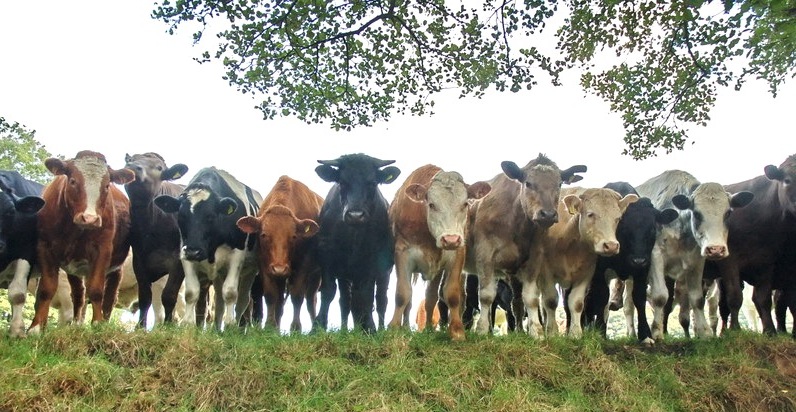
It’s heartening to see that the Occupy Wall Street protesters have included widespread industrial animal abuse in their list of atrocities perpetrated by the corporations that have taken over our governments:
“They have poisoned the food supply through negligence, and undermined the farming system through monopolization.
“They have profited off of the torture, confinement, and cruel treatment of countless animals, and actively hide these practices.”
A Sleep of Death
As we are awakening to the widespread corruption and inequity that are devastating our economic, governmental, environmental, and cultural well-being, I’ve found it to be highly illuminating to look deeply into our food system and its enormous repercussions that radiate into every aspect of our lives. As I discuss in The World Peace Diet, our unwillingness individually and collectively to recognize and take responsibility for the massive violence required by our food choices is our defining blind spot as a society. Sowing seeds of enslavement, cruelty, and terror in millions of animals who are confined and killed daily for food, we also sow the seeds, unfortunately, of our own oppression and demise. I believe that awakening from the socially imposed practice of eating meat and dairy products is the essential requirement for creating a new cultural foundation where equality, harmony, justice, and freedom are possible.
Paying for and eating animal-sourced foods is behavior that is profoundly antithetical to our interests on every level, and increasing numbers of us are realizing that besides damaging our physical health, eating meat and dairy is devastating our environmental, psychological, spiritual, and cultural health as well. However, as the Occupy Wall Street statement implies, animal agriculture serves well to concentrate power and wealth in the hands of elite corporate interests controlling the military-industrial-meat-medical-media complex that profit immensely from disease, environmental devastation, and war.
"If It Eats Like a Cow . . ."
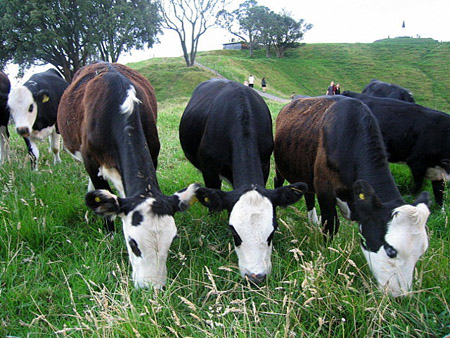 In this, our cultural situation parallels that of a typical dairy farm or beef feed-lot, and this is where the poignant riddle comes in: are cows really herbivores or omnivores? They surely seem to be herbivores! We all know that cows have a digestive system designed for eating grass. They evolved eating this way for millions of years in the grasslands of central Asia. Now, however, their diet is quite different. Their owners “enrich” their diet with corn, soy, wheat, and other grains in order to spur weight-gain, boost milk output, and increase profits. This diet is unnatural and causes the bovines to experience digestive distress, including the unnatural intestinal harboring of toxic E. Coli pathogens that sicken and kill hundreds of human consumers every year.
In this, our cultural situation parallels that of a typical dairy farm or beef feed-lot, and this is where the poignant riddle comes in: are cows really herbivores or omnivores? They surely seem to be herbivores! We all know that cows have a digestive system designed for eating grass. They evolved eating this way for millions of years in the grasslands of central Asia. Now, however, their diet is quite different. Their owners “enrich” their diet with corn, soy, wheat, and other grains in order to spur weight-gain, boost milk output, and increase profits. This diet is unnatural and causes the bovines to experience digestive distress, including the unnatural intestinal harboring of toxic E. Coli pathogens that sicken and kill hundreds of human consumers every year.
However, the riddle goes much farther than this. In addition to grain, agribusiness scientists long ago discovered that feeding cows animal protein, saturated fat, and cholesterol dramatically amplifies milk production, weight-gain, and consequent profits. The result is that for decades now, cows have been routinely fed diets not of grass, but of grain that is “enriched” with the rendered flesh and organs of fish, chickens, turkeys, pigs, and other animals, such as the millions of dogs and cats who are euthanized every year, and the road-kill and other carcasses collected by governmental agencies. Besides feeding the cows and steers all this meat from other species, they have been typically fed the ground-up slaughterhouse by-products of other cows (internal organs, nerves, brains, eyes, etc.), effectively turning them not just into carnivores, but into cannibals as well. This standard industry practice was supposedly stopped back in the '90s when it was discovered that it caused devastating mad-cow disease in human consumers of cow flesh. Nevertheless, we know that today, cows (as well as sheep, goats, pigs, and other obviously herbivorous animals) are eating huge amounts of meat because it boosts profits for the industry owners and operators, as well as the banks and financial institutions investing in the system.
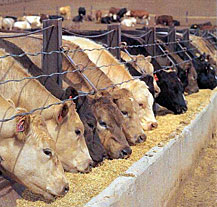 Cows dutifully eat what they’re fed, even when it causes them digestive distress, cancerous tumors, and many other problems. Their owners feed bovines fishmeal, slaughterhouse waste, and other animal-sourced foods not because it is in the cows’ interests to do so, but because they exploit the cows and use them for their own purposes. They also force many types of drugs, chemicals, and antibiotics on the cows, again, not because doing so is in the interests of the cows themselves, but because it is in their interests as owners and investors to increase productivity and profits. Ironically, bovines all die very young: beef steers at about eighteen to twenty-four months, and dairy cow slaves at about four or five years. Though they would naturally live about twenty-five years, they die hanging upside down by one leg in slaughterhouses, stabbed in the neck and bleeding to death, killed for profit by their owners, and for their flesh and skins by obedient consumers.
Cows dutifully eat what they’re fed, even when it causes them digestive distress, cancerous tumors, and many other problems. Their owners feed bovines fishmeal, slaughterhouse waste, and other animal-sourced foods not because it is in the cows’ interests to do so, but because they exploit the cows and use them for their own purposes. They also force many types of drugs, chemicals, and antibiotics on the cows, again, not because doing so is in the interests of the cows themselves, but because it is in their interests as owners and investors to increase productivity and profits. Ironically, bovines all die very young: beef steers at about eighteen to twenty-four months, and dairy cow slaves at about four or five years. Though they would naturally live about twenty-five years, they die hanging upside down by one leg in slaughterhouses, stabbed in the neck and bleeding to death, killed for profit by their owners, and for their flesh and skins by obedient consumers.
Set Up
Do cows ever suspect they’re being ruthlessly exploited, or that the meat in their diet is toxic and part of that exploitation? Do they suspect they’re fed meat because doing so benefits their exploiters? After so many generations of being conditioned to eat meat, cows may think it’s their natural food. How would they know differently?
Now try re-reading the above paragraph, replacing the word “cows” with the word “people.”
 The pharmaceutical-medical complex rakes in billions of dollars in profits from people eating diets high in meat, dairy products, and eggs, people who suffer from and buy drugs to treat the diseases caused by eating these foods: heart disease, cancer, arthritis, diabetes, strokes, obesity, osteoporosis, kidney disease, liver disease, autoimmune diseases, and so forth. This same industry brings in even more profits from people who eat foods sourced from animals who suffer terribly from the terror, frustration, and agony of modern animal confinement operations. Eating food products embodying this depression, anxiety, and insomnia, people ironically spend billions for psychiatric drugs to combat the same illnesses forced on the animals they eat. Drugging animals and humans, the pharmaceutical complex gorges on suffering to amass huge profits that enable it to control governmental bodies, the media, and public awareness. By analogy, the military-industrial complex profits from wars and policies that feed on disconnected, frustrated people, and powerful financial corporations steal people’s homes and wealth as dairy operations steal the cows' babies and milk.
The pharmaceutical-medical complex rakes in billions of dollars in profits from people eating diets high in meat, dairy products, and eggs, people who suffer from and buy drugs to treat the diseases caused by eating these foods: heart disease, cancer, arthritis, diabetes, strokes, obesity, osteoporosis, kidney disease, liver disease, autoimmune diseases, and so forth. This same industry brings in even more profits from people who eat foods sourced from animals who suffer terribly from the terror, frustration, and agony of modern animal confinement operations. Eating food products embodying this depression, anxiety, and insomnia, people ironically spend billions for psychiatric drugs to combat the same illnesses forced on the animals they eat. Drugging animals and humans, the pharmaceutical complex gorges on suffering to amass huge profits that enable it to control governmental bodies, the media, and public awareness. By analogy, the military-industrial complex profits from wars and policies that feed on disconnected, frustrated people, and powerful financial corporations steal people’s homes and wealth as dairy operations steal the cows' babies and milk.
Awakening
We can free ourselves when we awaken from the cultural food trance and its official story line—that meat and dairy are natural for us to eat—and switch to a plant-based way of eating that frees the animals, ecosystems, and people enslaved by this official story. Like cows, being fed meat and cheese is not in our interest, but is only in the interest of exploitive forces. By freeing others, we will attain freedom. By questioning the official food story and going vegetarian and then vegan, we open the door to discovering our purpose on this beautiful Earth, and to being able to create a new world of equality, freedom, and harmony.
May we contemplate deeply the riddle of the cows we dominate for food! Are they really the omnivores they’ve been forced into being? Are we?
Will Tuttle, educator and composer, is author of the acclaimed best-seller, The World Peace Diet, and is co-founder of the Circle of Compassion ministry. He has been a vegan since 1980. For Will's "My Pilgrimage" story, see W Tuttle and scroll down about two-thirds of the way.
Unset Gems
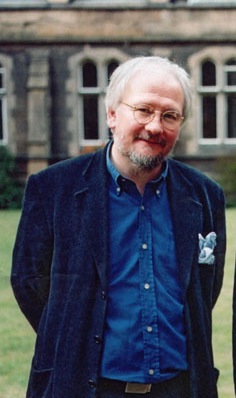 "We worship a false God when . . . we think only human beings matter to God . . . .
"We worship a false God when . . . we think only human beings matter to God . . . .
--Andrew Linzey, address at RSPCA service Oct. 2, 2011
"The thinking [person] must oppose all cruel customs no matter how deeply rooted in tradition and surrounded by a halo. When we have a choice, we must avoid bringing torment and injury into the life of another, even the lowliest creature; to do so is to renounce our [humanity] and shoulder a guilt which nothing justifies." --Albert Schweitzer
--Contributed by Lorena Mucke
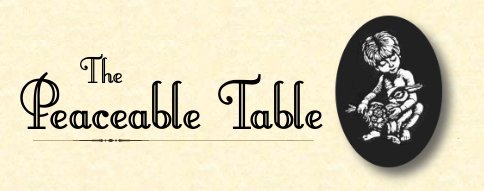
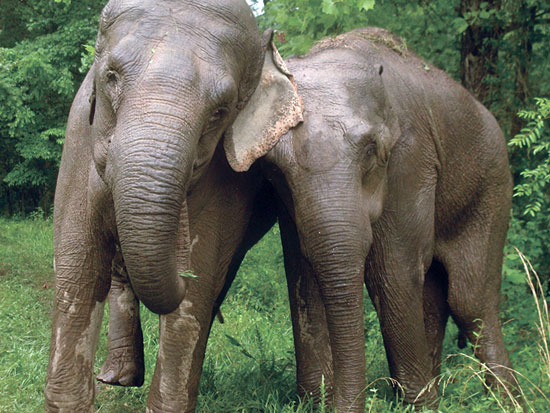
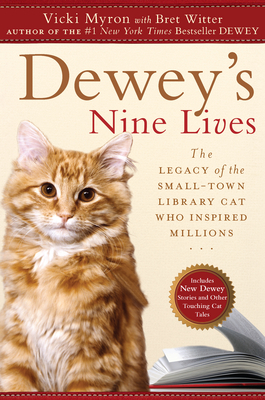 Millions know of Dewey, the librarian cat from Spencer, Iowa, who touched his readers' lives through Vicki Myron's original book, Dewey. This unforgettable feline, who entered the story as a tiny, half-dead kitten found in the library book drop one freezing morning, lived to be a beloved institution at the library, and died at the age of nineteen toward the end of that book. Now there is evidence that Dewey lives on through that work's influence. In Dewey's Nine Lives, the author tells two further stories about Dewey, and, perhaps more significantly, relates accounts of other important cats selected from out of the thousands of letters she received as a result of the first treatise.
Millions know of Dewey, the librarian cat from Spencer, Iowa, who touched his readers' lives through Vicki Myron's original book, Dewey. This unforgettable feline, who entered the story as a tiny, half-dead kitten found in the library book drop one freezing morning, lived to be a beloved institution at the library, and died at the age of nineteen toward the end of that book. Now there is evidence that Dewey lives on through that work's influence. In Dewey's Nine Lives, the author tells two further stories about Dewey, and, perhaps more significantly, relates accounts of other important cats selected from out of the thousands of letters she received as a result of the first treatise.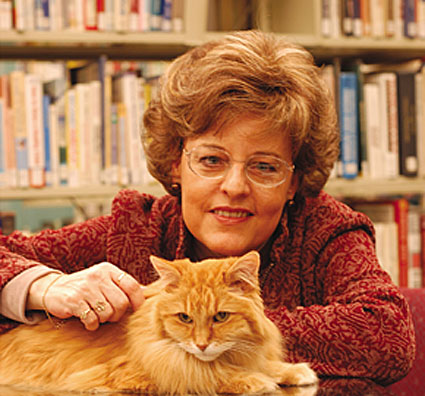 One could go on with more such narratives, but read the book. Myron and Witter do a marvelous job of telling these stories, largely about people we might callously dismiss as small-time or even as "losers," yet who have been loved by a cat and have loved her or him in turn. But surely there is no person alive whose life, if fully understood and appreciated, would not be as rich, as complex, or as profoundly telling of the human condition, as any out of Shakespeare or Tolstoy. God understands this, and in their way so do cats, whose love has nothing to do with whether we are beautiful, rich, and famous or quite the opposite. Indeed, some cats, like Dewey or the Providence, RI, hospice cat Oscar (see Review,
One could go on with more such narratives, but read the book. Myron and Witter do a marvelous job of telling these stories, largely about people we might callously dismiss as small-time or even as "losers," yet who have been loved by a cat and have loved her or him in turn. But surely there is no person alive whose life, if fully understood and appreciated, would not be as rich, as complex, or as profoundly telling of the human condition, as any out of Shakespeare or Tolstoy. God understands this, and in their way so do cats, whose love has nothing to do with whether we are beautiful, rich, and famous or quite the opposite. Indeed, some cats, like Dewey or the Providence, RI, hospice cat Oscar (see Review, 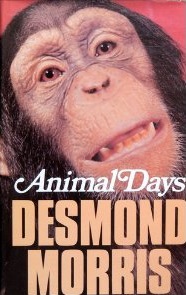 Chances are you have not read or even seen this book before, as it appeared more than three decades ago and did not make any big splash at the time. Earlier books by Morris did create quite a bit of controversy, notably his famous and controversial The Naked Ape (some of whose loudest critics had not read the book at all). Morris, a zoologist, looked at the human being, Homo Sapiens Sapiens, as an animal (a very offensive notion to some people) and studied us as a zoologist would.
Chances are you have not read or even seen this book before, as it appeared more than three decades ago and did not make any big splash at the time. Earlier books by Morris did create quite a bit of controversy, notably his famous and controversial The Naked Ape (some of whose loudest critics had not read the book at all). Morris, a zoologist, looked at the human being, Homo Sapiens Sapiens, as an animal (a very offensive notion to some people) and studied us as a zoologist would.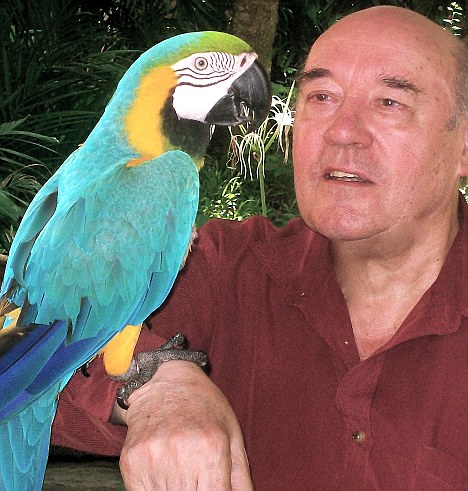 parents were often killed so their little ones could be confined as zoo inmates. The zoo breeding program made Morris realize a major problem: some animals (such as chimpanzees, gorillas, and pandas) who had been reared by humans thought of themselves as humans, were attracted only to humans, and simply could not be persuaded to mate with members of their own species. The results were sometimes comical, but more often tragic. Morris worked to find ways to solve this problem.
parents were often killed so their little ones could be confined as zoo inmates. The zoo breeding program made Morris realize a major problem: some animals (such as chimpanzees, gorillas, and pandas) who had been reared by humans thought of themselves as humans, were attracted only to humans, and simply could not be persuaded to mate with members of their own species. The results were sometimes comical, but more often tragic. Morris worked to find ways to solve this problem.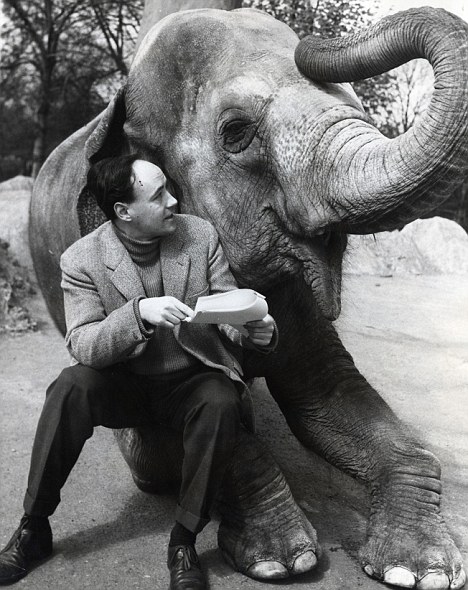 Of the many extraordinary stories in the book, the one I find the most amazing is that of the visit of Desmond and his wife Ramona to the Plaza de Toros (bullring) of Barcelona. The Morrises were very much opposed to the very concept of bulls being tortured for Neronian "entertainment." Nevertheless, they thought they should watch once, so they would not be like those people who fanatically attack books they have not read, movies they have not seen, ideas they do not understand. So they took their seats in the Plaza de Toros. However, the scheduled bull-baiting was cancelled by a sudden and unforeseen hailstorm. "If we had been deeply superstitious we would no doubt have felt that the gods had interceded to spare us the ordeal," comments Morris (page 263).
Of the many extraordinary stories in the book, the one I find the most amazing is that of the visit of Desmond and his wife Ramona to the Plaza de Toros (bullring) of Barcelona. The Morrises were very much opposed to the very concept of bulls being tortured for Neronian "entertainment." Nevertheless, they thought they should watch once, so they would not be like those people who fanatically attack books they have not read, movies they have not seen, ideas they do not understand. So they took their seats in the Plaza de Toros. However, the scheduled bull-baiting was cancelled by a sudden and unforeseen hailstorm. "If we had been deeply superstitious we would no doubt have felt that the gods had interceded to spare us the ordeal," comments Morris (page 263).  From hedge to hedge about the new-mown mead;
From hedge to hedge about the new-mown mead;